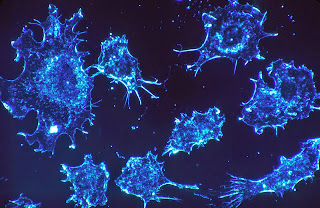Cancer at the molecular level
The body is made up of trillions of living cells. These cells grow, divide, and die in an orderly fashion. This process is regulated and controlled tight through the machinery of the DNA within the cell. In an infant or a child the normal cells divide rapidly to allow increased. Once the person make an adult, most of the cells divide to only replace worn or deaths cells or repair damage.
When the cells of the body in a given site begin to grow out of control, they may be cacerigenas. The increase in the cancer cell is different from normal cell growth. Instead of death, cancer cells continue to grow and form new abnormal cells. In addition, these cells can also invade other tissues. This is a property that normal cells do not possess.
The cancerous cells originate from normal cells when their DNA (deoxyribonucleic acid) or the original projects within the cell nucleus is damaged. DNA is in every cell and directs the actions of all the cell, increasing, death, Etc. of the protein synthesis when DNA is damaged in a normal cell to cell or repairing damage or dying cell.
Normally, the safeguards of the body against cancer via numerous methods, for example: apoptosis or a process by which abnormal cells die on their own accord, molecules of the Assistant (some DNA polymerases), possibly senescence or aging, etc.
In cancer cells, damaged DNA is not repaired, and the cell does not die. Instead it leads to more such abnormal cells with abnormal DNA. These new cells all have the same faulty original cancer cell DNA.
DNA damage can be inherited from parents or can be a spontaneous problem that occurs during the course of a person's life. This is called a mutation. DNA damage can also be triggered by exposure to certain environmental toxins such as present in cigarette smoke. However, there are multiple factors that can cause cancer and is difficult to fix the tip an exact cause.
Factors of cancer
According to the World Health Organization (WHO), the common risk factors for cancer include:
Tobacco use
Use of Alcohol
Excess weight and obesity
Dietary factors, including the low fruit and vegetable intake
Physical inactivity
Infections Chronicles of the helicobacter pylori, of the virus of hepatitis B (HBV), hepatitis C (HCV) and some types of human papillomavirus (HPV) virus
Environmental and risk professional including inionizante and ionizing radiation
Agents that can cause cancer include:
Chemical carcinogens
Several chemicals and environmental toxins are responsible for changes in normal cellular DNA. Substances that cause DNA mutations are called mutagens, and mutagens that cause cancers are known as carcinogens.Certain substances have been connected to the specific types of cancer. Tobacco use is associated with many forms of cancer, and causes 90% of lung cancer. Similarly, prolonged exposure to asbestos fibers is associated with mesothelioma.
Tobacco is also related to other cancers such as lung, larynx, load, neck, stomach, diaphragm, kidney, esophagus and pancreas as it contains other carcinogens known, including nitrosamines and polycyclic aromatic hydrocarbons.
Ionizing radiation
Radiation due to radon gas and prolonged exposure to ultraviolet radiation from the Sun can lead to melanoma and other skin malignancies. Radiation therapy given to a type of cancer can also cause other types of cancer. For example, those who receive radiation therapy of the breast for lymphomas may develop later breast cancer.Bacterial and viral infections
Some cancers may be caused by infections with pathogens. Notable among these include cancers of the liver due to infections of Hepatitic B and C; cancer of the cervix due to infections with the virus of human papillomavirus (HPV); Epstein Barr virus that causes Lymphoma Burkitt and gastric cancer or stomach due to Helicobacter pylori infection.
Cancer genetic or inherited
Common examples are inherited breast cancer and genes in ovarian cancer including syndrome of BRCA1 and 2. Li-Fraumeni include defects in the p53 gene that leads to bone cancers, cancers of the breast, soft tissue sarcomas, those Etc. with Down syndrome brain cancers are known to develop malignancies such as leukemia and testicular cancer.
Hormonal changes
Notable among these is changes in the levels of the female hormone estrogen. Excess estrogen is uterine cancer.
Dysfunction of the immune system
Immunity Empeorada including the HIV infection leads to several cancers including lymphoma, Kaposi's sarcoma, non-Hodgkin and HPV-associated malignancies such as anal cancer and cervical cancer.

No comments:
Post a Comment